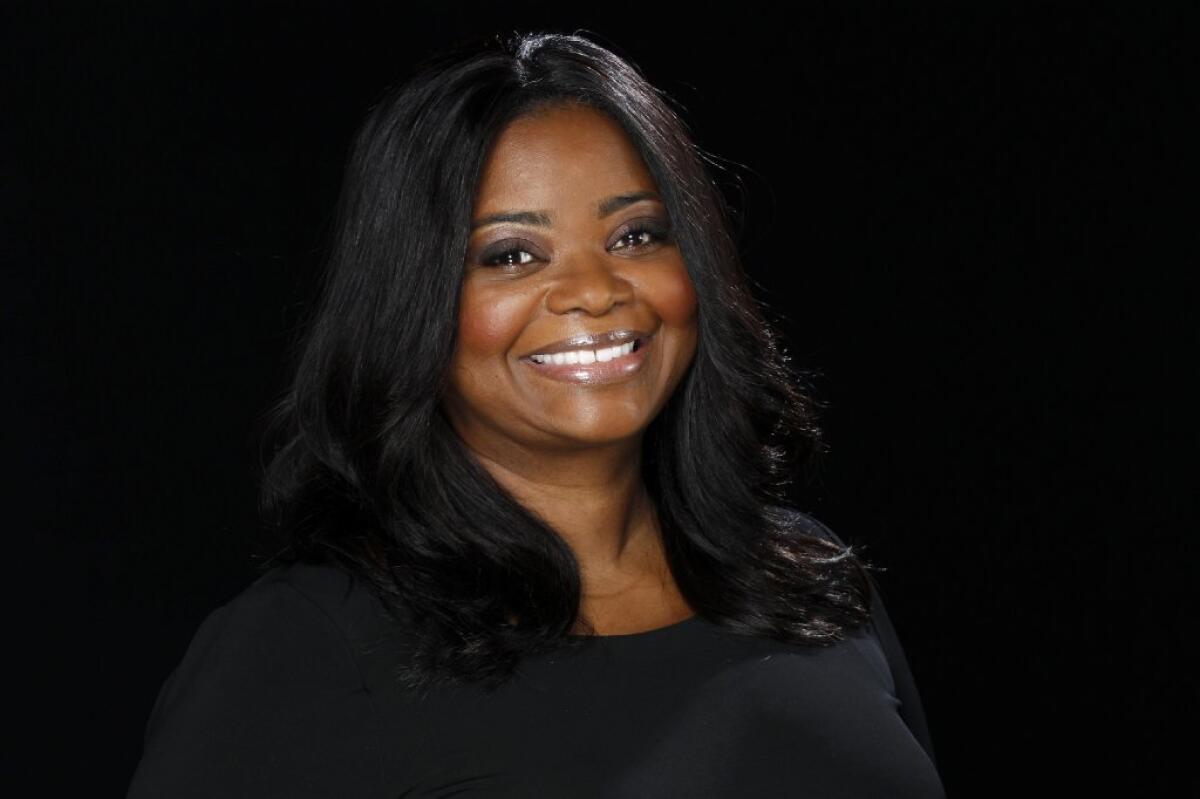Octavia Spencer proud to show that everyone has something to contribute with ‘Hidden Figures’

- Share via
Octavia Spencer’s penchant for playing strong, charismatic women has blessed her with numerous awards — and her second Oscar nomination for supporting actress for her role as mathematician and spunky NASA supervisor Dorothy Vaughan in the feel-good historical drama “Hidden Figures.” (She won the same award in 2012 for her spirited portrayal of feisty Minny Jackson in “The Help.”)
The attention keeps her busy. Consider, late last month, the Academy Award nominations were announced on a Tuesday (making her the first African American actress nominated for a second Oscar after a previous win); that Thursday she was in Boston to pick up Harvard’s esteemed Hasty Pudding award (“It was my Queen for a Day experience, I even had a parade!”), that Sunday she was on stage with the rest of the “Hidden Figures” cast accepting the film ensemble trophy at the Screen Actors Guild awards (“My idea of acting is it’s always all about the ensemble; we’re all storytellers telling the story”).
Catching her by phone the next day, she noted how, “yes, it’s been crazy, but it’s all good. Everything about it is so good.”
What were you thinking standing up there for the SAG Award? You looked quite emotional.
So many things; I ran the gamut of emotions last night [thinking about] how it has taken 50 years for these women to have their stories told and finally they’re now getting their due, and also about how the movie is resonating with people. I felt such pure elation as an actress and about the cast camaraderie and the fact everybody gets to walk away with a prize. And about what’s going on in our nation right now too. When Taraji [P. Henson, who plays Katherine Johnson] talked about unity, and about what happens when we put our differences aside, what we can accomplish — literally outer space and the moon. So it was all of that.
Did you know the film was going to be such a big hit as you were making it?
No, my only thought was how I can’t believe we’ve never been taught this in school and for some crazy reason Katherine Johnson’s name isn’t inextricably linked with John Glenn’s. I mean it’s a huge part of his story that wasn’t told. Glenn almost didn’t go [on his mission as the first American to orbit the Earth], and the only reason he did was because Katherine Johnson checked the numbers. And to me that historical oversight is just, it kind of rubs me the wrong way.
I understand you now choose roles with a three-pronged approach: educate, entertain and escape. How did this evolve?
The older you get the more you think about what you’re putting out into the world and how you want to help shape young minds. This is one of those projects I felt every child, black or white, girl or boy, could benefit from. Because with this really strange changing of the guard currently in our nation there’s a void for people who are considered “the other.” If you’re nonwhite and non-male it’s a very scary time. So for young kids with all of this going on, I wanted it to be about empowerment and understanding how they all have something to contribute, as did these women. My character had a great quote: “I changed what I could, and what I couldn’t, I endured.” Remember at the time these women lived, they didn’t have a say in the process but, still, they did the work. That’s what’s important; they withstood the adversity.
You recently purchased tickets for a screening here in L.A. for needy kids and their families to see the film. How did that come about?
I wanted to do it on the Martin Luther King Jr. holiday weekend for people who actually couldn’t afford to see the film. As a kid, I remember when the first “Star Wars” movie came out, we couldn’t afford to go; I had to wait and watch it on TV. I remember those types of things and how people would constantly talk about things that we couldn’t afford. So for me it was about empowering kids. I passed out the tickets, which was fun, letting them know they mattered.
See the most read stories this hour »
ALSO:
Meet the ‘Hidden Figures’ mathematician who helped send Americans into space
Michael Shannon connected to his ‘Nocturnal Animals’ lawman character from the get-go
Meet Allison Schroeder, the NASA-loving writer of ‘Hidden Figures’ nominated for an Oscar
More to Read
Sign up for The Envelope
Get exclusive awards season news, in-depth interviews and columnist Glenn Whipp’s must-read analysis straight to your inbox.
You may occasionally receive promotional content from the Los Angeles Times.








